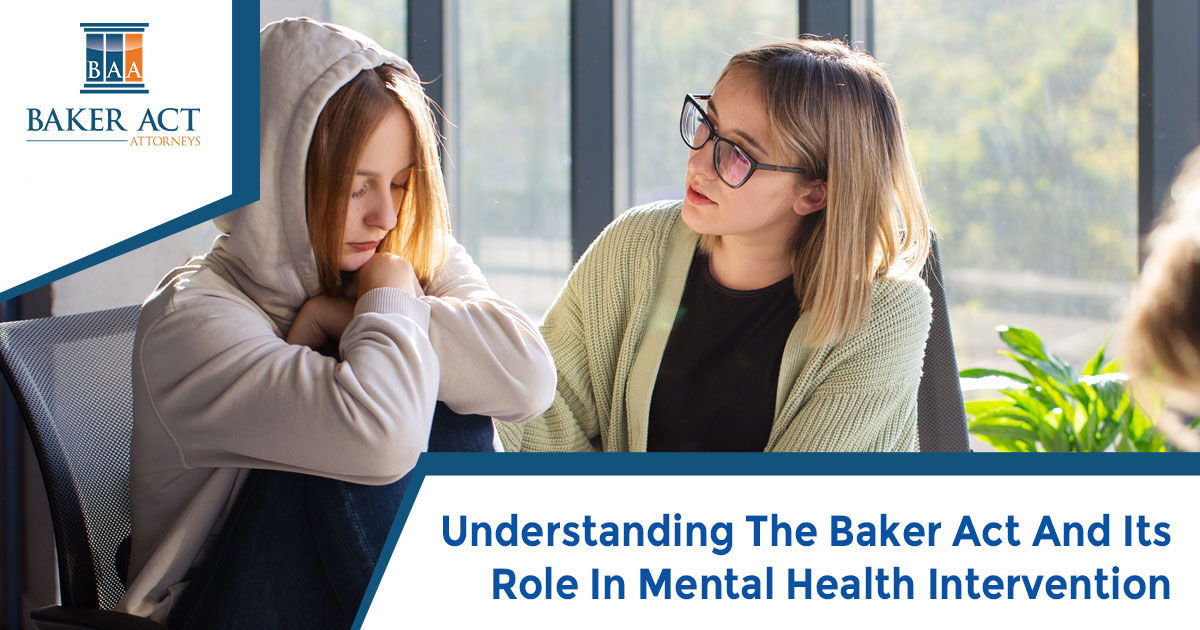The Baker Act is the cornerstone of Florida’s mental health legislation. It plays an important role in helping those struggling with mental illness to access the help they need, and in some cases, it is a life-saving intervention. If you have a loved one with a mental illness, developing a basic understanding of the Florida Baker Act can help you decide whether it is the right mental health intervention for their specific circumstances.
What Is The Baker Act?
The Baker Act was passed in 1971 as part of an effort to overhaul Florida’s outdated mental health laws. It serves multiple purposes, including regulating the provision of the state’s mental health care services, ensuring the safety of the public, protecting the rights of those with mental illness, and setting out a range of mental health care interventions for people experiencing a mental health crisis. The Baker Act is Chapter 394 of the Florida Statutes, and its key provisions deal with voluntary admissions, involuntary examination, and involuntary placement – each of which we’ll be discussing in greater detail below.

What Role Does The Baker Act Play In Florida’s Mental Health Law?
Before we discuss the Baker Act, it’s important to understand its role in the broader context of Florida’s mental health legal framework. The Baker Act cannot be used in circumstances where a person needs medical intervention primarily due to a substance abuse disorder or developmental disability, and this is where the Marchman Act and guardianship law come into the picture.
When a person is experiencing mental impairment due to substance abuse to such an extent that they pose a risk to themselves and/or others, the Marchman Act, and not the Baker Act, is the appropriate intervention to use. Under the Marchman Act, a person can be held for involuntary assessment for a substance abuse disorder and be ordered to undergo treatment for up to 90 days. As for those with developmental disabilities, guardianship is often the most appropriate intervention to ensure their well-being. A guardianship appointment gives a trusted family member or professional guardian the authority to make important decisions on behalf of the mentally disabled person (provided their disability is of such an extent that they are not able to manage their own affairs).
Key Provisions Of Florida’s Baker Act
The Baker Act is a complex piece of legislation that is updated fairly frequently. This high-level overview of the Act deals with its key provisions, but you should keep in mind that there may be other sections of the Baker Act (or Florida’s broader legal framework) that are relevant to your loved one’s circumstances.
Voluntary Admission
Voluntary admission is the most straightforward Baker Act process. Voluntary admission occurs when an adult person, or the parent of a minor, applies to a registered treatment facility (called a ‘receiving facility’ in the Act) for observation, evaluation, and treatment. However, voluntary admission is only applicable in circumstances where a person has the ‘competence’ to consent to their treatment. Someone is incompetent to consent to treatment because they are so impacted by their mental condition that they are unable to make a well-reasoned decision concerning their medical treatment. If a person is incompetent in terms of the Act, then the only way they can receive treatment is through the involuntary examination and placement processes.
Involuntary Examination
The involuntary examination process is the centerpiece of Florida’s Baker Act. It is this process that people are generally referring to when they say that someone has been ‘Baker Acted’. The Act’s involuntary examination provisions allow for a person to be taken into custody by law enforcement (one of three ways a person can be Baker Acted) and transported to their nearest receiving facility to be examined by a psychiatrist. A person can only be subject to the involuntary examination process if:
- They are experiencing mental/emotional impairment to such an extent that they can no longer control their actions or perceive reality, and this impairment substantially hinders their ability to cope with the demands of ordinary life; and
- As a result of this impairment, the individual is unable to determine if they require psychiatric examination and treatment, or if they have outright refused treatment; and
- If they are not treated, they will likely suffer neglect that will result in serious harm, or they are likely to cause serious harm to themselves or others.
The involuntary examination process can be commenced in three ways. First, a concerned person may petition the court to grant an order directing law enforcement to take a person meeting the above criteria into custody. Second, a law enforcement official may take a person who meets the criteria to a receiving facility. Third, a physician or psychologist who has examined a person and determined they need a psychiatric evaluation may issue a professional certificate to this effect and request law enforcement to take them to a receiving facility. Regardless of how involuntary examination has commenced, a person may only be kept in the receiving facility for up to 72 hours.
In Florida, the Baker Act’s involuntary examination provisions play an important role in giving families a lifeline when a loved one is experiencing a mental health crisis and is a clear danger to themselves. However, Baker Acting a loved one should only be resorted to when all other methods of attempting to get a loved one into treatment have failed. Being taken into custody by law enforcement and held at a facility can be a traumatic experience, and in some cases may leave a person in a worse condition. Preferably, you should try to convince your loved one to receive treatment as an outpatient, or to voluntarily enter treatment at a facility of their choosing. Of course, if your loved one is threatening self-harm or poses a danger to others, petitioning to court with the assistance of a reputable Baker Act attorney may be the best way to protect their well-being.
Involuntary Placement
The Baker Act also sets out a process for the involuntary placement of a mentally ill person, referred to as ‘involuntary placement’. The Act’s involuntary placement process can only be used when someone has already been involuntarily examined and the administrator of the receiving facility files a petition for involuntary placement with the court, supported by the opinion of the examining psychiatrist and a second opinion of another psychiatrist or psychologist. The opinion must state that the individual has been examined within the preceding 72 hours and that they meet the requirements for involuntary placement, namely:
- They have refused voluntary placement or are unable to determine whether it is necessary; and
- They are incapable of surviving by themselves, and if not placed in treatment are likely to suffer neglect that poses a real threat of harm to their well-being; or there is a strong likelihood (as evidenced by recent behavior) that they will soon inflict serious bodily harm on themselves or another person if they are not placed in treatment; and
- Less restrictive methods for treating their condition have been judged to be inappropriate and are unlikely to be effective.
A court hearing is then held, at which the mentally ill person is represented by counsel, ensuring a fair hearing. The court will consider all evidence provided by the receiving facility and determine whether the person meets the requirements for involuntary placement. If the court grants the petition, the person may be held for up to six months.
Involuntary placement is a significant limitation of a person’s rights and freedoms, and should only be ordered in serious cases. If you suspect your loved one is at risk of being held when this is not warranted, you should immediately contact an experienced Florida Baker Act attorney to explore your options for contesting the involuntary placement petition.
Is Baker Acting Your Loved One The Right Intervention For Them?
There is no doubt that in the decades since its introduction, the Florida Baker Act has been a life-saving intervention for thousands of people experiencing severe mental illness. However, the intervention is not without its risks: when used inappropriately, it can result in trauma and worsened symptoms. Ideally, the Baker Act should only be used in extreme cases to de-escalate a mental health crisis.
At Baker Act Attorneys, we have helped countless families navigate Florida’s mental healthcare framework and decide on an appropriate plan of action for their loved one’s treatment. Our depth of experience in this complex area of law, combined with our exceptional client service, sensitivity, and compassion, make us the law firm of choice for anyone navigating a loved one’s mental health crisis.
If you would like to arrange a consultation, don’t hesitate to contact us today at 855-429-0074.

